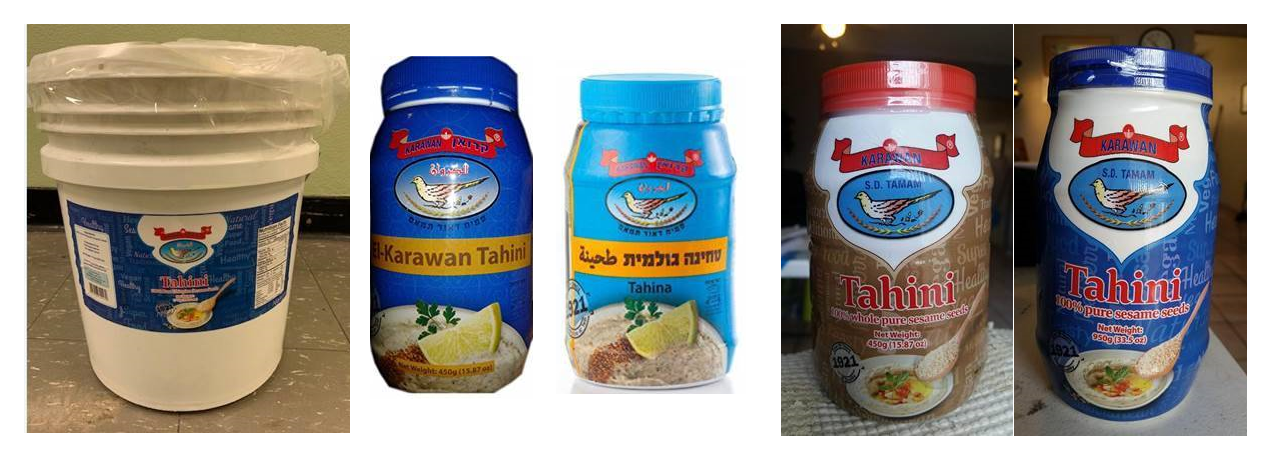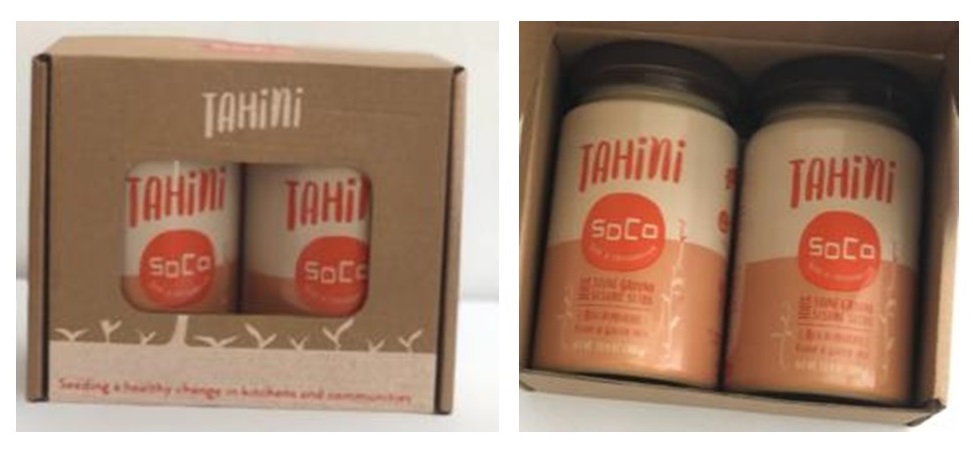Outbreak Investigation of Salmonella Concord: Tahini (May 2019)
Outbreak linked to Karawan and Soco brand tahini appears over; FDA issues warning letter to U.S. importer
August 13, 2019 Update:
On July 30, 2019, the FDA issued a Warning Letter to Brodt Zenatti Holdings, LLC., the U.S. importer of Karawan Tahini and Halva. In response to the 2019 outbreak of Salmonella Concord, the FDA conducted a Foreign Supplier Verification Program (FSVP) inspection, which found that the importer did not develop and implement an FSVP, as required. Upon receipt of the Warning Letter, the company has 15 working days to respond to the agency with plans to correct the violation or evidence that the company has corrected the violation.
Recommendation
The tahini of concern may be labelled as either “Karawan Tahini,” “El-Karawan Tahini,” or “Soco Tahini.” Consumers should avoid eating this tahini. This tahini was sold in bulk to retailers and restaurants and was also available to consumers at retail locations and online. It may have also been used in other food products sold to consumers. Consumers should be aware that this product has a shelf life of two years and should check their homes for tahini with either label. Consumers with this tahini in their home should not eat it and should discard it. Consumers with concerns about tahini consumed outside the home should ask their restaurant or retailer if the product they have purchased contains this tahini. Retailers and restaurants should throw the recalled product out and sanitize any surfaces that may have come in contact with this tahini.
Tahini is made from sesame seeds and can be served on its own or used as an ingredient in Mediterranean and Middle Eastern style dishes, such as hummus, falafel, and baba ganoush.
On this Page
Case Counts
Total Illnesses: 6
Hospitalizations: 1
Deaths: 0
Last illness onset: May 2, 2019
States with Cases: NY(4), MA(1), TX(1)
What Products were Recalled?
Karawan Tahini
- 450-g (16-oz)
- 17-kg (600-oz)
- 3-kg (106-oz)
SoCo Tahini
- 380-g (13-oz)
On June 10, 2019 Brodt Zenatti Holdings, LLC expanded their recall to include 106-ounce buckets of Karawan Tahini. On May 20, 2019 Brodt Zenatti Holdings, LLC of Jupiter, Florida expanded their recall to include SoCo brand tahini sold in 135-ounce containers. This product is being recalled in addition to retail and bulk Karawan brand tahini sold in 16-ounce jars and 39-pound buckets, including those imported prior to December 2018.
The initial voluntary recall by Brodt Zenatti Holdings, LLC occurred on May 15, 2019 and included retail and bulk Karawan brand Tahini, sold in 16-ounce jars and 39-pound buckets that were imported from Palestine between the dates of December 2018 to January 2019. On Tuesday, May 14, 2019, Brodt Zenatti Holdings, LLC agreed to initiate a product recall.
What is Salmonella?
Salmonella are a group of bacteria that can cause gastrointestinal illness and fever called salmonellosis. Most people infected with Salmonella will begin to develop symptoms 12 to 72 hours after infection. The illness, salmonellosis, usually lasts four to seven days and most people recover without treatment.
Most people with salmonellosis develop diarrhea, fever, and abdominal cramps. More severe cases of salmonellosis may include a high fever, aches, headaches, lethargy, a rash, blood in the urine or stool, and in some cases may become fatal.
Children younger than five, the elderly, and people with weakened immune systems are more likely to have severe salmonellosis infections.
Learn more:
What Else Should Restaurants and Retailers Do?
In the event that retailers and/or other food service operators are found to have or handled Karawan tahini or other potentially contaminated food in their facilities, they should discard is and:
- Contact their local health department and communicate to their customers regarding possible exposure to Salmonella.
- Wash the inside walls and shelves of the refrigerator, cutting boards and countertops, and utensils that may have come in contact with recalled tahini; then sanitize them with a solution of one tablespoon of chlorine bleach to one gallon of hot water; dry with a clean cloth or paper towel that has not been previously used.
- Wash and sanitize display cases and surfaces used to potentially store, serve, or prepare recalled tahini.
- Wash hands with warm water and soap following the cleaning and sanitation process.
- Conduct regular frequent cleaning and sanitizing of cutting boards and utensils used in processing to help minimize the likelihood of cross-contamination.
What Else Should Consumers Do?
People who think they might have become ill from eating possibly contaminated tahini should talk to their health care providers.
Consumers should follow these steps for preventing foodborne illness:
- Wash the inside walls and shelves of the refrigerator, cutting boards and countertops, and utensils that may have contacted contaminated foods; then sanitize them with a solution of one tablespoon of chlorine bleach to one gallon of hot water; dry with a clean cloth or paper towel that has not been previously used.
- Wash and sanitize surfaces used to serve or store potentially contaminated products.
- Wash hands with warm water and soap following the cleaning and sanitation process.
Consumers can also submit a voluntarily report, a complaint, or adverse event (illness or serious allergic reaction) related to a food product.
Previous Updates
June 26, 2019
Today, the CDC announced that the outbreak appears to be over. The FDA has concluded its investigational activities related to this outbreak.
June 12, 2019
On June 10, 2019 Brodt Zenatti Holdings, LLC expanded their recall to include 106-ounce (3-kg) buckets of Karawan Tahini.
May 31, 2019
On May 30, 2019 Karawan Tahini and Halva was added to Import Alert 99-19 for products that appear to be adulterated due to the presence of Salmonella, which allows the FDA to detain products without physical examination.
May 23, 2019
On May 20, 2019 Brodt Zenatti Holdings, LLC of Jupiter, Florida expanded their recall to include SoCo brand tahini sold in 135-ounce containers. This product is being recalled in addition to retail and bulk Karawan brand tahini sold in 16-ounce jars and 39-pound buckets.
May 17, 2019
On May 17, 2019 Brodt Zenatti Holdings, LLC of Jupiter, Florida expanded their initial recall to include all tahini products, including those imported prior to December 2018 and until the final shipment in April 2019.
The initial voluntary recall by Brodt Zenatti Holdings, LLC occurred on May 15, 2019 and included retail and bulk Karawan brand Tahini, sold in 16-ounce jars and 39-pound buckets that were imported from Palestine between the dates of December 2018 to January 2019. On Tuesday, May 14, 2019, Brodt Zenatti Holdings, LLC agreed to initiate a product recall.
The label of the product that tested positive for Salmonella identified Brodt Zenatti Holdings, LLC, of Jupiter, Fla., as the importer of that specific tahini, however, other importers may have also imported “Karawan Tahini and Halva” branded tahini. Additionally, the sample that tested positive by State partners did not have lot codes or information identifying the shipment date.
May 15, 2019
The United States Food and Drug Administration, along with the Centers for Disease Control and Prevention (CDC), and state and local partners, are investigating a multistate outbreak of Salmonella Concord illnesses linked to “Karawan Tahini and Halva” brand tahini imported from Israel.
The FDA has been working with the state of New York and New York City. The New York City Department of Health and Mental Hygiene tested samples of Karawan tahini and found that the product contained Salmonella.
Based on the positive product sample, the available epidemiological data, and traceback data from the investigation, the FDA has requested that the product be voluntarily recalled. Discussions with the U.S. agent for the firm, as well as foreign public health partners are ongoing and additional information will be provided as it becomes available.
The label of the product that tested positive for Salmonella identified Brodt Zenatti Holdings, LLC, of Jupiter, Fla., as the importer of that specific tahini, however, other importers may have also imported “Karawan Tahini and Halva” branded tahini. The investigation is ongoing, but at this time the current outbreak does not appear to be related to the previous 2018-2019 outbreak of Salmonella Concord linked to tahini.
Who to Contact
Consumers who have symptoms should contact their health care provider to report their symptoms and receive care.
To report a complaint or adverse event (illness or serious allergic reaction), you can
- Call an FDA Consumer Complaint Coordinator if you wish to speak directly to a person about your problem.
- Complete an electronic Voluntary MedWatch form online.
- Complete a paper Voluntary MedWatch form that can be mailed to FDA.


